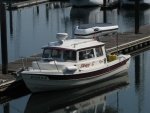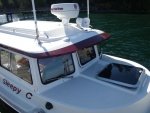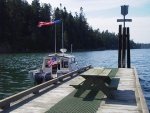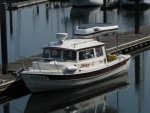Last night I rad about the loss of a Brand new Benateau 60, and 5 souls in the South China Sea on a delivery from Hong Kong to the Philippines about a month ago.
Lessons from the exchange about the loss:
1. The EPRIB was not registered until the day before the voyage, and 3 days before it was activated: The information was not in the SAR system in Hong Kong, which delayed rescue attempts. Be sure you register any PLB or EPRIB well before a trip.
2. The boat's skipper made a Sat Phone contact in the Philippines 9 hours before the EPRIB was activated. There was not evidence of distress at that time, and apparently little was said about the impending storm. Good shore contact is essential, A sat phone or text message (Spot Messenger, or Delorme Inreach) is a very good idea, but be sure to relay plans, and any concerns from the boat and from the shore. It is not clear if the danger of storm was discussed. This might just be 20 miles offshore, as well as 150 miles.
3. A search plane was not able to spot any debris or a vessel at the position of the EPRIB. (May have been some time after the signal was lost --which was over 48 hours)--No second EPRIB or PLB was on board. If a second EPRIB is aboard (recommended for ocean voyages), it should not be activated until 48 hours, or the battery of the first unit has discharged. This assures that SAR knows that you are still alive, and in need of rescue. That will increase possibility of SAR finding you. The PLB should be activated last--and also serves as a beacon for SAR localization.
4. DSC: The general opinion was that there were very few successful rescues with DSC. This confirms that most DSC radios are not registered, or the operator is not familiar with DSC. This does not mean that DSC should not be used,--but that don't count on it--have the PLB or EPRIB!
5. The DSC should be left on, and not canceled, until rescue is available. DSC can act as a "Beacon" for RDF. There are SART- AIS beacons, (Like man overboard beacons,) which are short range portable AIS transmitters, by Kannad Marine, Weatherdock, and McMurdo. "AIS SARTS also collect your coordinates via GPS but they take this information and (like older RADAR activated SART) broadcast it to all nearby ships." This transmits your distress location to nearby ships, specifically in Man over board, but like the DSC enabled VHF will serve as a beacon to get all ships involved.
6. McMurdo, and Kannad Marine are now making GPS enabled PLB with
48 hour minimal length of service batteries, as the EPRIB has currently. It might be worth considering getting one of these, when you upgrade the PLB-
-batteries are user replaceable (5 year battery life)
http://www.landfallnavigation.com/maxgplb.html
7. Near Coast, or if in fleets offshore, DSC may/will be useful--if other vessels or shore stations are in in VHF range. DSC is also available in MF and HF (SSB) radios--these are rarely monitored, and it is strongly suggested than any boat traveling outside of the VHF range be equipped with either a Sat Phone, or some satellite texting device.
We say--How does all of this apply to us C Dory owners? We do take our boats offshore, and into areas where there is no VHF radio reception. The PLB/EPRIB takes at least 30 minutes to get rescue under way (because of layers of the SAR/confirmation by contacts that boat or person is where it may be in distress. We might be better served--as Sat Phones become cheaper/ Sat texting devices (SPOT Messenger or Delorme Inreach) may give both a faster and more specific response. For example, with the rescue at Lake Powell, it took us about an hour to get help--both because of difficulty with Cell phone and VHF marine reception. A Sat phone would have gotten help much faster. In this case, it didn't make a difference--in many emergencies, it might--such as massive trauma, or a heart attack.
The Benateau 60 and the 5 people aboard were never found.




